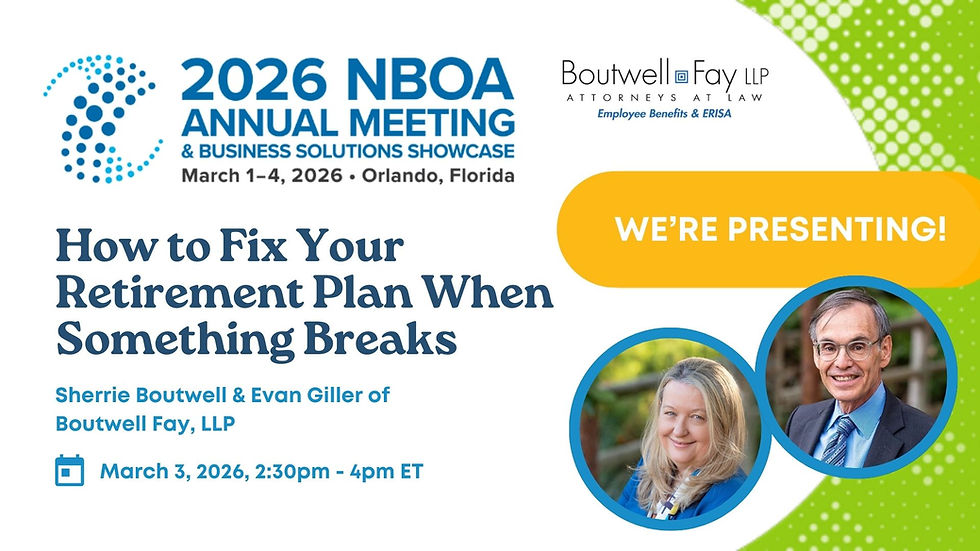Supreme Court Sides with Cornell Plan Participants on a Technical Point with Big Implications
- Boutwell Fay LLP

- Apr 18, 2025
- 3 min read
The conflict in the circuit courts regarding defeating ERISA prohibited transaction claims on a technical pleading standard are over. In Cunningham v. Cornell University, the U.S. Supreme Court unanimously held that plaintiffs asserting prohibited transaction claims under ERISA §406(a)(1)(C) do not need to plead facts related to the §408(b)(2)(A) exemption to survive a motion to dismiss. Instead, it’s now up to plan fiduciaries to raise and prove that an exemption from the prohibited transaction rules applies as an affirmative defense.
While this may sound like a procedural footnote, it’s anything but. Simply paying a recordkeeper or investment platform or other plan service provider out of plan assets creates a potential prohibited transaction because all such transaction are prohibited unless the exemption is met (both in form and in operation).
The ruling directly overrules the approach adopted by several appellate courts, including the Second Circuit, which had required plaintiffs to plead that a transaction didn’t qualify for an exemption, effectively flipping the burden. Justice Sotomayor rejected that view in no uncertain terms: “Plaintiffs seeking to state a §1106(a)(1)(C) claim must plausibly allege that a plan fiduciary engaged in a transaction proscribed therein, no more, no less.”
New Pleading Standards Under Cunningham:
Under Cunningham, plan participants now have a simpler path to survive a motion to dismiss. To survive a motion to dismiss under ERISA §406(a)(1)(C), a plaintiff must only plausibly allege:
A fiduciary caused the plan to engage in a transaction;
The fiduciary knew or should have known it involved furnishing goods, services, or facilities;
The transaction was with a party in interest.
They are not required to plead:
That the transaction involved unreasonable compensation;
That the services were unnecessary;
Or that any other aspect of the §408 exemption does not apply.
While Cunningham centers on a procedural rule, it makes fiduciary governance and documentation more critical than ever. Courts will likely be looking at the substance of the decision-making process and the facts concerning the application of the service provider exemption: Was the arrangement prudent? Were fees reasonable? Are the terms of the service contract reasonable? Which is a requirement of the exemption - see: https://www.boutwellfay.com/post/10-questions-to-ask-before-signing-that-new-service-agreement-2.
Cunningham does not mean fiduciaries are left without any procedural options. In a concurring opinion, Justice Alito (joined by Justices Thomas and Kavanaugh) warned that this “straightforward application” of ERISA’s text could lead to “untoward practical results.” He noted that common, innocent conduct might now result in expensive litigation, simply because it falls within the statute’s broad language.
Justice Sotomayor suggested a number of approaches that district courts could use to limit meritless litigation. Alito agreed and encouraged district courts to use Federal Rule of Civil Procedure 7(a), which allows courts to require plaintiffs to file a reply once a defendant raises an affirmative defense. In effect, this could shift some of the burden back onto plaintiffs, but at a later stage in the process, after the initial motion to dismiss. So, while the initial pleading burden has been lowered, early-stage procedural filtering hasn’t disappeared, it’s just been delayed. District courts still have discretion to control the pace and scope of litigation when appropriate.
While Cunningham resolves a procedural question, its practical implications for plan sponsors and fiduciaries will need to be clarified by the lower courts. The case now returns to the U.S. District Court for the Southern District of New York, where the plaintiffs will get the opportunity to move forward, this time under a clarified standard that no longer requires them to preemptively disprove statutory exemptions.

Boutwell Fay is a leading law firm specializing in employee benefits and ERISA.
With a focus on providing customized solutions and exceptional client service, we help businesses navigate the complexities of employee benefit plans. Our team of experienced attorneys is dedicated to delivering results that exceed our clients' expectations.
CA 949-660-0481
NY 332.900.2550







Comments